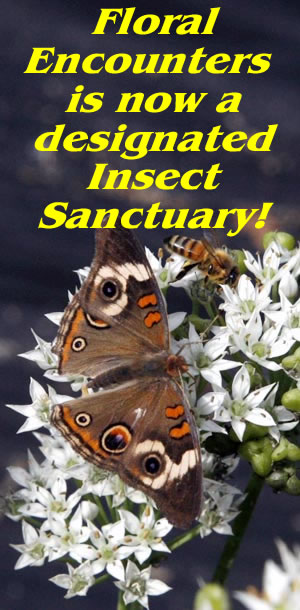THE NATURAL LAWNBeing more green about your garden.In the garden (and nature) there is nothing more unnatural than a lawn. It's a monoculture and nature rarely if every produces monocultures. It is also very labor intensive and even more alarming very demanding of chemicals. You have to fertilize it, use grub control, weed control and many other kinds of pest control on it just to keep that artificial monoculture going. Why? The main reason why is because the general public has been brainwashed by the chemical companies to think that monocultures are good, that you must have the perfect weed free lawn. This is the ultimate for a garden. Nothing could be further from the truth. The main reason the chemical companies say you should have a monoculture is because they have no way of keeping the good plants that are not grass in your lawn while removing the annoying ones. Thirty years ago having clover and other legumes in your lawn was an excepted practice. They help keep the lawn healthy and feed the grass plants needed nitrogen. However the newer chemicals killed the grass too, so the advertising campaign changed to state that clover was bad and you needed to remove it. This is an takeoff of the famous P. T. Barnum trick when he had a shipment of white salmon and stated boldly ‘guaranteed not to turn pink in the can’! There was no one better at marketing than P. T. Barnum. I collected this wonderful gem of information from a couple of chemical engineers retiring from a large lawn chemical company. They did not like the practice but had to admit that it had made the company millions of dollars and done a really good job of convincing the general public that a monoculture lawn was the way to go. It's not. Having other plants in your lawn is going to make it a happier healthier lawn. Establishing clover and/or bird’s foot trefoil (legumes) in your lawn will immediately reduce the amount of fertilizer you need to give it since the legumes produce nitrogen from nodules on their roots which help feed the whole lawn. It also ensures that there is diversity in the lawn and that many lawn problems are reduces. The main reason that so many bugs such as grubs and web worms can devastate a lawn it because they have been dropped into a huge bowl of wonderful food! What more could a bug want than a whole lawn full of food, it does not have to search out the plants it wants they are all the same and right there. IT can just chomp away from one plant to the next. A monoculture lawn is like a desert. There is little for other animals and plants to feed on so there are very few other good bugs and soil organism living in the lawn area to fight off the unwanted bugs when they arrive. Hence you have a big problem with your hard to maintain monoculture and no help from the natural predators out there which don't like the desert you have created. Diverse lawns also need a lot less water than monocultures. Many of the plant roots are large and can go down deeply breaking up any hard packed soil - thus helping to remove compaction in your lawn - and bringing more nutrients to the upper areas of the soil where the grass roots can use them. Before too long use of chemicals on lawns is certainly going to be heavily restricted if not banned all together. In some areas this is already true. Ontario has banned the domestic use of many chemicals and little if anything can be used on lawns. Water is also becoming a much bigger problem and soon it will be frowned upon in many places if not most places to use water to feed useless grass. Creating a strong diverse lawn now means you can save fertilizer, chemicals and water - meaning money, and lots of time trying to create something that is almost impossible to maintain in nature. What can you do? Make sure you have a lawn seed mix that is suitable for your area. Growing the wrong grass type in your area can be a real problem. Seed your lawn with Clover and/or Bird's Foot Trefoil. These legumes produce nitrogen and help feed the lawn. These plants will also stay green in times of drought so when all your neighbors lawns are brown and horrible yours will still be green. It will also keep the soil together with their strong roots so as we have more changes in the weather with more droughts and flooding these plants will ensure your soil is stabilized and won't was away in a flood or blow away in a drought. Don't get so upset about other weeds in your lawn. A few dandelions here and there or other weeds won't hurt the lawn. If you keep the lawn cut short you can't even tell from a distance that it's not a monoculture so don't waste your time money and effort on it. You may need to take some action of one weed attempts to take over your whole lawn but otherwise leave them alone. They are helping the ecology and make the lawn look pretty when they flower. Enjoy all the extra time and money you have now you don't have to spend it on the lawn!
|
| Janice Hazeldine PhD is the owner and head grower of Floral Encounters an organic Medicinal Herb farm that is also a designated sanctuary for pollinators. |





